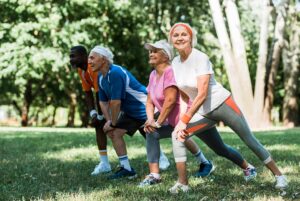
[ad_1]
 A latest examine on the College of Jyväskylä in Finland found that participating in a year-long train program will help older adults (aged 70-85) keep and even barely enhance the structural properties of their femoral neck regardless of a lower in bone mineral density. The members, who have been beforehand bodily inactive, underwent a multicomponent train coaching intervention.
A latest examine on the College of Jyväskylä in Finland found that participating in a year-long train program will help older adults (aged 70-85) keep and even barely enhance the structural properties of their femoral neck regardless of a lower in bone mineral density. The members, who have been beforehand bodily inactive, underwent a multicomponent train coaching intervention.
Curiously, those that included extra average and high-intensity actions of their routines skilled much less bone density decline than these with decrease exercise ranges or depth. Postdoctoral Researcher Tiina Savikangas emphasizes the importance of even quick bursts of exercise for bone well being, noting that impacts akin to brisk strolling contribute to raised preservation of bone mineral density.
As we age, each the quantity and depth of bodily exercise are inclined to lower, resulting in a decline in bone well being. Nonetheless, this examine highlights the significance of structured workout routines and on a regular basis actions in sustaining bone well being. The findings counsel that incorporating bone-loading influence actions into every day routines, like brisk walks or stair climbing, could be useful.
Postdoctoral Researcher Tuuli Suominen suggests sensible methods to incorporate high-intensity exercise in every day life, resembling performing jumping-like impacts with out precise leaping—by lifting up on tiptoes after which dropping down onto the heels. This easy addition to routine actions can contribute to raised bone well being, particularly within the femoral neck, which is inclined to fall-related fractures.
Stopping hip fractures entails preserving bone mineral density on the femoral neck and decreasing the danger of falls. The examine means that growing every day bodily exercise, notably in older people who should not common exercisers, might improve bone well being and forestall fractures by enhancing purposeful capability and muscle energy. Robust muscular tissues decrease the danger of falls and permit bones to be loaded extra effectively.
The analysis is a part of the PASSWORD examine carried out by the College of Sport and Well being Sciences and Gerontology Analysis Centre on the College of Jyväskylä between 2017 and 2020. Involving 299 members aged 70 to 85 from Jyväskylä, the examine targeted on people who have been much less energetic than beneficial earlier than the intervention.
All members engaged in progressive muscle energy, endurance, steadiness, and suppleness coaching, with half additionally taking part in a pc coaching program targeted on info processing abilities. Accelerometers measured the quantity and depth of bodily exercise earlier than and after six months of coaching, whereas dual-energy X-ray absorptiometry assessed femoral neck bone density and structural properties earlier than and after the one-year train program.
The analysis findings are revealed within the journal Bone.
[ad_2]